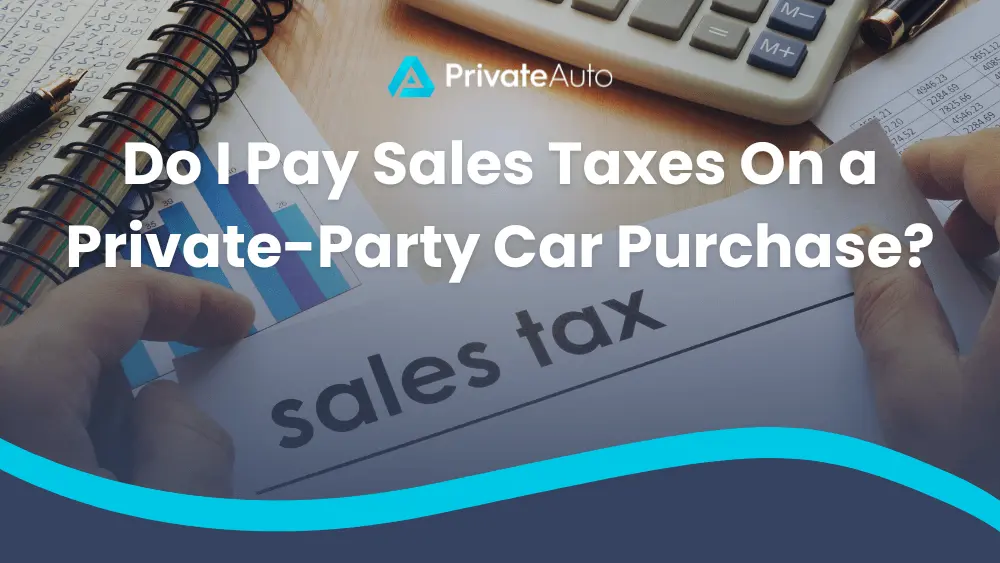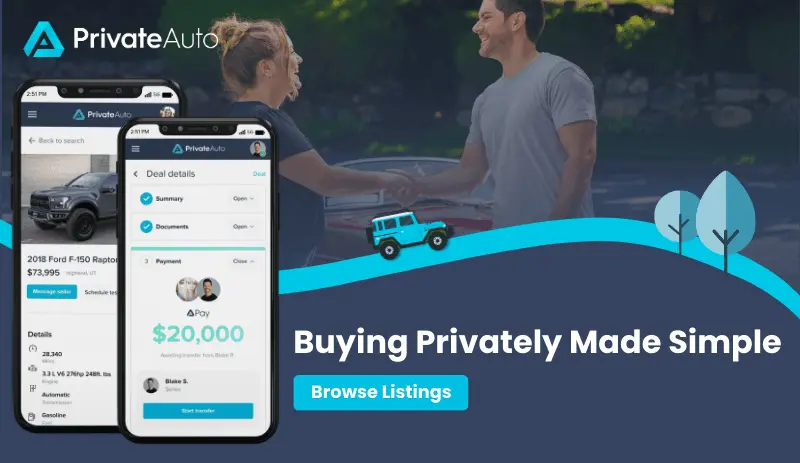In addition to state sales tax, you’ll probably also owe additional taxes and fees related to registration, license plates, title transfer, and city or county taxes.
What states don’t charge vehicle sales tax?
Which States Have No Sales Tax?
1. Alaska
2. Delaware
3. Montana
4. New Hampshire
5. Oregon
No-Tax Tax States
Tax Exemptions for Private-Party Sales
Are private-party purchases better?
The Benefits of Purchasing from a Private Party
1. You drive the deal on your terms. PrivateAuto allows you to make offers and negotiate the best deal directly with the seller.
2. Get a better price by cutting out the middleman and going straight to the source. Dealers must buy low and sell high to make a profit and keep the lights on. You don’t need to fund them.
3. Avoid dealer fees. Car dealerships charge documentation fees that range from $50 to over $1,000.
4. Enjoy security and convenience when you do the deal with PrivateAuto. Our transactional marketplace gives dealer-like convenience in the palm of your hand. From scheduling the test drive to sending instant payments, you’ll love how easy the process is.
5. In Hawaii, Arizona, and Nevada, as we’ve noted, private-party sales are exempt from state sales taxes, whereas dealership sales are taxed.
How are sales taxes calculated?
How Is Car Sales Tax Calculated?
Sales tax is calculated as a percentage of the vehicle’s purchase price. Some people think they can outsmart the government by negotiating a low “official” purchase price and paying the rest in a side transaction. But the government can’t be fooled so easily.
If the government suspects that the purchase price of the vehicle was artificially decreased, it will calculate sales tax based on the car’s fair market value.
The government establishes what the car is worth on the open market by referring to Kelley Blue Book or other reliable sources on used car prices. If they conclude that the car’s fair market value is greater than its purchase price, they can opt to base sales tax on the fair market value.
It is important to note that underreporting the purchase price of a vehicle to avoid paying sales tax is illegal. If you are caught doing this, you could be subject to a fine of up to $5,000.
Can I avoid paying sales taxes?
Can I Avoid Paying Sales Tax?
States require that you pay sales tax on your car when you register it, regardless of where you purchased it. Most states have reciprocal agreements with neighboring states, so you will still be required to pay sales tax if you live in a state with sales tax and purchase a car in a state without.
Say you live in Washington State and you drive to Oregon to purchase a used vehicle from a private party. Buying a car in Oregon does not get you around paying Washington sales tax once you go to register it in Washington.
Some states annually charge a personal property tax based on your car’s current value. Some cities in the United States also tax vehicle owners annually. For instance, if you live in Boston, your yearly excise tax for a car worth $25,000 would be $650, or $25 for every $1,000. This is on top of the auto sales tax charged by the state of Massachusetts.
You’ll need to follow the tax laws applicable to the state in which you register the vehicle. When you purchase from a dealership, taxes are due before the car leaves the lot. You’ll pay sales tax in a private party sale when you register your new-to-you vehicle.
How to finalize ownership?
How to Finalize Ownership of a Used Car?
The previous owner will have signed the title over to you when you purchased the car. Now you need to finalize the title transfer with your state. At the same time you do so, you will register the car in your name and get new plates.
Here are some of the most commonly required documents that a state’s DMV will require:
- A completed vehicle title transfer and registration application form
- Proof of auto insurance
- Proof of identity (driver’s license or government-issued ID card)
- Bill of sale—done through the PrivateAuto mobile app with e-signatures
- The original title (or a duplicate title, if the original one had gotten lost)
- An odometer disclosure statement—required by some states
- A highway safety inspection—required by some states
- Payment for your state’s car sales tax, if applicable
Paperwork requirements will vary from state to state, but you should expect to bring the following documents:
1. Valid driver’s license
2. Proof of auto insurance
3. A bill of sale
4. Completed certificate of title
5. Emissions test certificates
6. A completed registration form
In most states, you will have 30 days to register the car.
Looking to sell your car? Create a listing on PrivateAuto and connect with interested buyers today!
Car Taxes FAQ
Do you have to pay taxes on a used car in Nevada?
When you buy from a Nevada dealership, you’ll owe Nevada’s 4.6% sales tax—but not when you buy from a private seller.
Regardless of whether you purchase from a dealer or private party, you’ll owe other taxes and fees, including car registration, auto insurance, and car title fees when you purchase a car in Nevada.
Many counties offer discounts on car registration fees for seniors and military members. You can also use fuel tax credits if you drive an alternative fuel vehicle.
Do I have to pay sales tax on a used car in Arizona?
Arizona doesn’t charge sales tax on private-party car sales, but it does on dealership purchases. In either scenario, you’ll owe Arizona’s annual vehicle license tax (VLT), which is calculated by taking 60% of the manufacturer’s base retail price and subtracting 16.25% for each year since the car was first registered in Arizona.
Who pays sales tax when selling a car privately in NJ?
New Jersey charges a 6.625% sales tax on vehicle purchases, which is paid by the buyer. In addition, individual counties charge as much as 0.5%, bringing your total tax bill as high as 7.125% of the purchase price of the car.
What fees apply when registering an out-of-state vehicle in New Jersey?
If you purchase a vehicle from an out-of-state dealer, you’ll also pay the difference between your home state’s sales tax rate and New Jersey’s when you register the car in NJ. And, as with all vehicle purchases, there is also a $60 registration fee and a $5 title certification fee.
How to avoid paying sales tax on a used car in California?
To avoid paying sales tax on a used car transaction in California, you must provide proof that the car was acquired as a gift or under a court order or qualify for a tax examination.
This can be done by entering the word “gift” on the back of the title and completing a REG 256 form. If you are buying a car from someone who has already paid sales tax on it, you may also be eligible for an exemption.
Another exemption is for court orders; if the vehicle was transferred as part of a divorce decree or other court order, the buyer can present the court order to avoid paying sales tax.
How to avoid paying sales tax on used a car in Florida?
There’s no way around it—property taxes, income taxes, sales taxes, and other taxes are part of life. You are required by law to pay sales tax on used cars in Florida or any other state that charges sales tax—unless you meet an exemption.
How to avoid paying sales taxes on a used car in Arkansas?
Vehicles that were purchased for $4,000 or less are exempt from paying Arkansas sales tax. Other exemptions may apply to religious organizations or other categories.
How to pay sales tax on a used car?
To pay sales tax on a recently purchased used car, go to the DMV, Department of Revenue, or appropriate agency for your state. You’ll pay sales tax when you transfer the title, register the car in your name, and get new license plates.
To calculate the tax owed, multiply the purchase price of the vehicle by the sales tax rate. For example, if you live in a state with a 6% sales tax rate and buy a used car for $15,000, the sales tax would be 6% of $15,000, equaling $900. Feel free to use our sales tax calculator to help you budget.
If you’re buying a car from an individual seller, you’ll usually need to pay the tax yourself. To calculate the tax, you’ll need to know your state’s sales tax rate and the purchase price of the vehicle.
For example, let’s say you live in a state with a 6% sales tax rate and you’re buying a Toyota Camry for $15,000. The sales tax would be 6% of $15,000, or $900.
Some states also charge motor vehicle excise tax, personal property tax, or other taxes on vehicle purchases.
Depending on your location, you may have to pay more than one type of tax after buying a car, including sales tax, excise taxes, and title taxes. Sales tax is usually based on the purchase price of the car. Excise taxes are typically levied by the state or local government, and they are usually based on the vehicle’s weight or engine size. Title taxes are usually imposed by the state Department of Motor Vehicles, and they are based on the value of the car.
When you purchase a new car, there are several additional fees and taxes that you need to budget for. These can include a documentation fee, registration fee, and sales tax.
How to avoid paying sales tax on a used car in NY?
If you’re planning on purchasing a used car in New York, there are a few ways you can avoid paying sales tax.
– If the vehicle is a gift from a family member, you will not be required to pay sales tax.
– If you paid out-of-state sales tax when you purchased the car, you can apply for a refund of the difference.
– If you were not a resident of New York when the vehicle was purchased, you may be exempt from paying sales tax.
– If you are a member of the U.S. Armed Forces or you are not a resident of the state of New York, you may also be exempt from paying sales tax.
Keep in mind that these exemptions may vary depending on your situation, so it’s always best to check with the New York DMV before purchasing.
What are the different taxes owed on a vehicle?
The most common taxes associated with vehicle purchases include:
– Sales tax
– Excise tax
– Use tax
– Personal property tax


